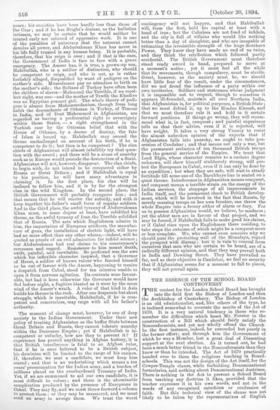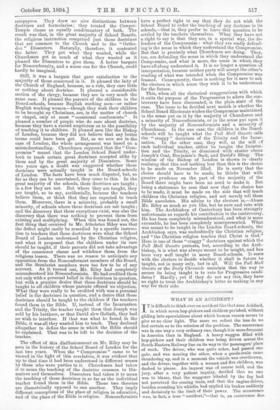THE ESSENCE OF THE SCHOOL BOARD CONTROVERSY , T HE contest for
the London School Board has brought into the field first the Bishop of London and then the Archbishop of Canterbury. The Bishop of London is an old educationalist, and, like others of the type, he is inclined somewhat to overrate the merits of the Act of 1870. It is a very natural tendency in those who re- member the difficulties which beset Mr. .Forster in the construction of a Bill which should fairly satisfy the Nonconformists, and yet not wholly offend the Church In the first instance, indeed, he succeeded but poorly in the former effort; and through him the Government of which he was a Member, lost a great deal of Dissenting support at the next election. As it turned out, he had been a much better friend to the Nonconformists than they knew or than he intended. The Act of 1870 practically handed over to them the religious teaching in Board- schools. This was not the design of the Act itself, for the Cowper-Temple clause, while forbidding Denominational formularies, said nothing about Denominational doctrines. There is nothing in the Act to prevent a School Board from teaching any doctrine it likes, provided that the teacher expresses it in his own words, and not in the words of any recognised catechism or confession of faith. But this technical view of the clause was not likely to be taken by the representatives of English ratepayers. They drew no nice distinctions between doctrines and. formularies; they treated the Cowper- Temple clause as equally condemnatory of both. The result was that, in the great majority of School Boards, the religious instruction comprised just those doctrines that are common to the Church and. to the "Ortho- dox " Dissenters. Naturally, therefore, it contented the latter. They got what they wanted, while the Churchmen got so much of what they wanted as it pleased the Dissenters to give them. A better bargain for Nonconformity, and. a worse one for the Church, could. hardly be imagined.
Still, it was a bargain that gave satisfaction to the majority of those concerned in it. It pleased the laity of the Church of England, because, as a rule, they care little or nothing about doctrine. It pleased a considerable section of the clergy, because they are in very much the same case. It pleased the parents of the children in the Board-schools, because English working men—or rather English working women—though they wish their children to be brought up Christians, are, in the matter of church or chapel, only at most "occasional conformists." It pleased a number of people who do care about doctrine, because they have a rooted scepticism as to the possibility of teaching it to children. It pleased men like the Bishop of London, because they did not believe that any better terms could have been got. But, as we now see in the case of London, the whole arrangement was based on a misunderstanding. Churchmen supposed that the" Com- promise" meant that the London School Board under- took to teach certain great doctrines accepted alike by them and by the great majority of Dissenters. Some two years ago, a doubt was suggested whether these doctrines were actually taught in the Board-schools of London. The facts have been much disputed, but, so far as they can be ascertained, they come to this. In the great majority of the schools, these doctrines are taught ; in a few they are not. But where they are taught, they are taught, so to say, accidentally, because the teachers believe them, or think that they are expected to teach them. Moreover, there is a minority, probably a small minority, of schools where these doctrines are not taught ; and the discovery that these exceptions exist, was also the discovery that there was nothing to prevent them from existing and multiplying. When this was found out, the first thing that occurred to Mr. Athelstan Riley was that the defect might easily be remedied by a specific instruc- tion to teachers that these doctrines were what the School Board of London understood by the Christian religion, and what it proposed that the children under its care should be taught, if their parents did not take advantage of the conscience clause and withdraw them from the religious lesson. There was no reason to anticipate any opposition from the Nonconformist members of the Board, and the Secularist members were too few to be of any account. As it turned out, Mr. Riley had completely misunderstood his Nonconformists. He had credited them not only with a personal belief in the doctrines in question, but with a genuine desire that these doctrines should be taught to all children whose parents offered no objection. 'What they were really to be credited with was a personal belief in the doctrines in question, and a desire that these doctrines should be taught to the children if the teachers found them in the Bible. If, instead of the Incarnation and the Trinity, the teacher taught them that Joseph was sold by his brethren, or that David slew Goliath, they had no wish to interfere. If that was what he found in the Bible, it was all they wanted him to teach. They declined altogether to define the sense in which the Bible should be explained. That was to be left to the decision of the teacher.
The effect of this disillusionment on Mr. Riley may be seen in the history of the School Board of London for the last two years. When the " Compromise " came to be viewed in the light of this revelation, it was evident that up to that time it had been understood in different senses by those who were parties to it. Churchmen had taken it to mean the teaching of the doctrine common to Dis- senters and themselves. Dissenters had taken it to mean the teaching of these doctrines in so far as the individual teacher found them in the Bible. These two theories are diametrically opposed to one another. They imply different conceptions of the place of religion in education, and of the place of the Bible in religion. Nonconformists have a perfect right to say that they do not wish the School Board to order the teaching of any doctrine in its schools,—that is, they prefer to leave this question to be settled by the teachers themselves. What they have not a right to say is that they are, in a special way, the de- fenders of the Compromise : what they are really defend- ing is the sense in which they understand the Compromise. But that is precisely what Churchmen are doing. They, too, are defending the sense in which they understand the Compi omise, and what is more, the sense in which they have all along understood. it. It is no longer a question of interpretation, because neither party will accept the other's reading of what was intended. when the Compromise was framed. Consequently, there is nothing for it save to ask the electors in which sense they wish it to be understood for the future. This, when all the rhetorical exaggerations with which it suits the purpose of the Progressives to adorn the con- troversy have been discounted, is the plain state of the case. The issue to be decided next month is whether the School Board Electorate wishes the Compromise maintained in the sense put on it by the majority of Churchmen and a minority of Nonconformists, or in the sense put upon it by the majority of Nonconformists and a minority of Churchmen. In the one case, the children in the Board- schools will be taught what the Pall Mall Gazette calls the "craggy" doctrines of the Trinity and the Incar- nation. In the other case, they will, at the will c f each individual teacher, either be taught the Incarna- tion and the Trinity, or dismissed with stories about Joseph's Coat, Benjamin's Sack, and David's Sling. The' wisdom of the Bishop of London is shown in clearly realising that this and nothing less than this is the choice to be made on November 22nd. He is sorry that the choice should have to be made, he thinks that with greater prudence on the part of the majority of the Board there might have been no need to make it. But being a statesman he sees that now that the choice has' tobe made, it must be made on the aide that will teach children the Christian religion, and. not merely tell them Bible anecdotes. His advice to the electors is,—Abuse Mr. Riley as much as you like, but be sure and vote with him. The Archbishop of Canterbury has been strangely unfortunate as regards his contribution to the controversy.. He has been completely misunderstood, and what is more excusable, he has been completely misrepresented. What was meant to be taught in the London Board-schools, the Archbishop says, was undoubtedly the Christian religion, and "the Christian religion teaches that Christ is God.' Here is one of those "craggy" doctrines against which the Pall Mall Gazette protests, but, according to the Arch- bishop, it is what was always meant to be taught, and has been very well taught in many Board-schools. It rests- with the electors to decide whether it shall in future be taught, not in many only, but in all. Will the Pall Mall Gazette or the Daily Chronicle maintain that the way to secure its being taught is to vote for Progressive candi- dates Hardly ; yet if they do not say this, they have- no right to treat the Archbishop's letter as making in any way for their side.





































 Previous page
Previous page